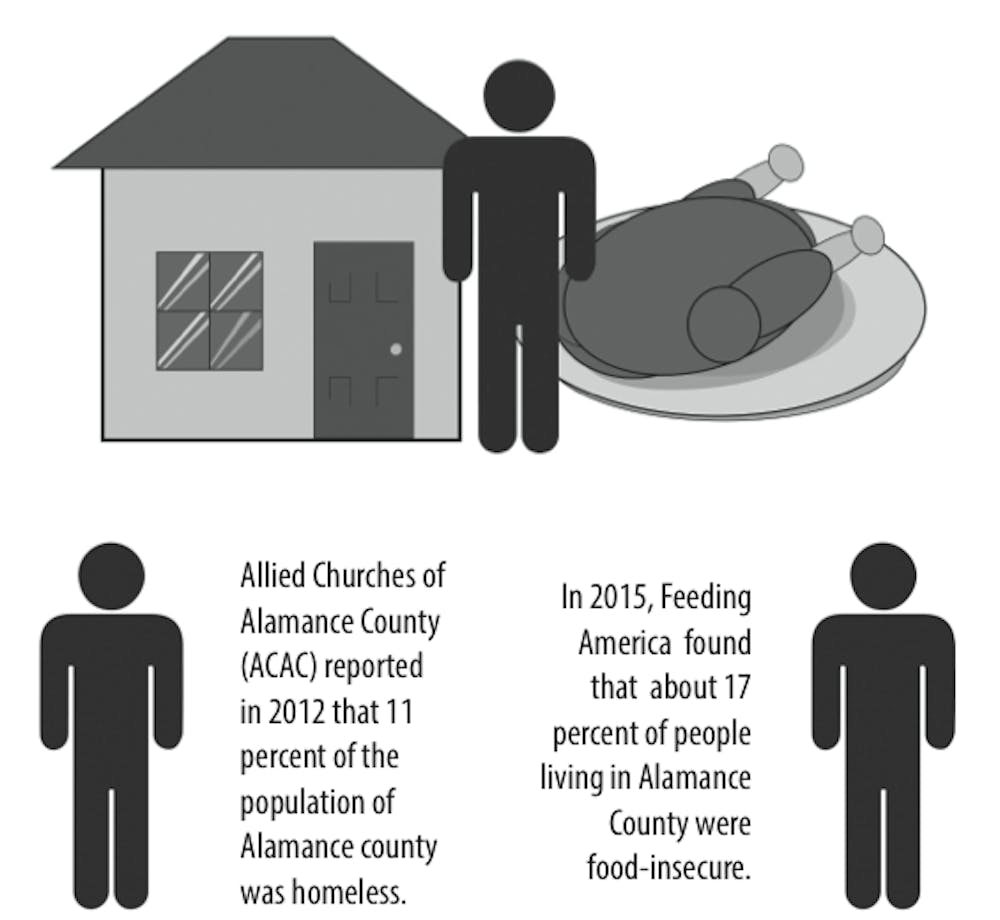The ability to attend Elon University or any college in general is a privilege, but what truly highlights this privilege is the prevalence of homelessness and food insecurity surrounding campus.
Feeding America’s 2015 research showed that 16.7 percent of Alamance County’s population is food-insecure. Elon has relayed these facts to the student population through its Stop Hunger Now campaign. This national initiative is focused on feeding the food-insecure through packed meals that offer nutritional sustenance to those in need around the world. This past year’s event at Elon for Stop Hunger Now was held in McKinnon Hall and around 280 students packed more than 40,000 meals.
Elon also addresses the issue of local homelessness through Campus Kitchen. This weekly program on campus collects unused food from community partners like Elon Dining services and Loy Farm and sends the food to those in need in the Burlington community through the Allied Churches of Alamance County (ACAC).
ACAC provides an emergency shelter, a resource day center, a community kitchen and a food pantry for the homeless and needy in Alamance County. ACAC reported that 11 percent of the citizens in Alamance County were homeless in 2012. The Allied Churches shelter in Burlington provides enough beds for 96 individuals.
But hunger and homelessness aren’t the only issues being addressed in Alamance County.
As of January 2015, ACAC partnered with United Way of Alamance County and DeBoer & Gabriel Builders, Inc. to address unaffordable housing in Alamance County. ACAC’s Rapid Rehousing Program is aimed at housing individuals and families in safe and stable homes by providing rental assistance for the first four months.
Family Abuse Services (FAS) provides shelter and other forms of assistance to victims of domestic violence and child abuse. In 2014, the emergency housing facility took in 14 individuals — nine of the 14 individuals were children. This organization partnered up with the County Department of Social Services to help disburse Alamance County’s share of Temporary Assistance for Needy Families (TANF) funds as well.
Though assistance is offered, a tremendous need still exists.
One FAS staff member said thousands of homeless individuals each year aren’t taken in by either shelter because both organizations don’t have enough room and can’t afford to expand their facilities.
“Allied Churches also has to turn so many homeless people away because they are very underfunded,” the staff member said.
Nevertheless, there is still some progress in addressing serious issues like homelessness.
The Burlington Development Corporation, a nonprofit affiliate of Burlington Housing Authority, provides a rapid re‐housing program that offers private units for three homeless families.
The Alamance County Community Services Agency (ACCSA) placed 101 extremely low‐income families or individuals living in substandard homes or threatened with homelessness into affordable and decent housing. ACCSA also supplies counseling and case management services, limited financial help for security deposits and rent and mortgage assistance for 425 households to obtain or uphold their housing.
City of Burlington Community Development Administrator, Shawna Tillery said there are government initiatives to address homelessness through federal grants. She is in charge of supervising the allocation of money to nonprofit organizations like ACAC, FAS, and Residential Treatment Services.
Tillery said Burlington is looking at improving its homeless shelters in quality rather than quantity because of the lack of funding.
“Fixing this requires money,” Tillery said. “Our federal funding has been cut for the past 6 years.”
In Tillery’s opinion, transportation is at the forefront of getting homeless individuals jobs in order to afford housing. She said she hopes the new Route 4 busing system for Alamance County will provide more people the ability to get to work. But even with transportation, Tillery has her doubts that Alamance county citizens will be able to afford housing with minimum wage jobs.
“The National Low Income Housing Authority says the cost of renting a two-person apartment in Alamance County requires an hourly pay of $13.37,” Tillery said. “This isn’t feasible for many citizens who can only get minimum wage jobs at $7.25 an hour.”
Despite numerous resources available in Alamance County to address issues of homelessness, hunger and housing, Feeding America’s most recent data of food-insecure individuals is numbered at 25,450.


